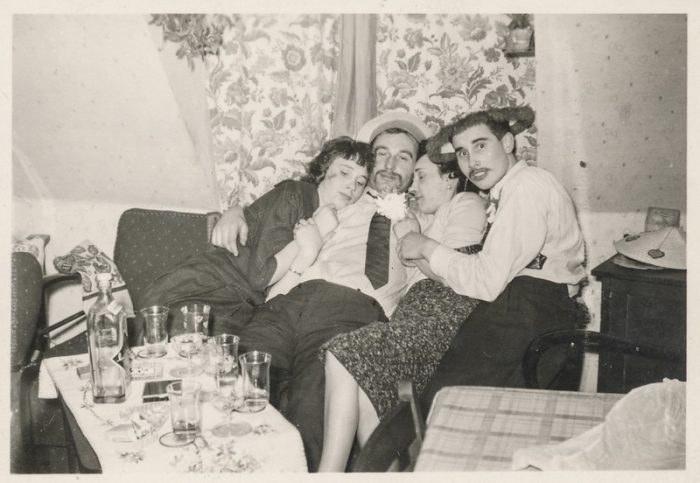The past few years have been…eventful, to say the least.
They’ve also been equal parts stressful, traumatizing, joyous, lonely, and overwhelming.
And there’s nowhere I’ve seen the effects of these emotions more than in my own relationships. Everything seems heightened—the highs feel higher and the lows feel lower.
This isn’t just in my romantic relationship either. There’s a shift in all my connections, be it family, friends, or work. It seems like, as a whole, we are tired of surface-level relationships. Of relationships that cross (or completely ignore) our boundaries. Of relationships that don’t feel genuine. Of relationships that don’t meet our needs. Of relationships that don’t feel like they can go the distance.
Of relationships that aren’t a full-bodied yes.
Over the past few years, we’ve all dealt with our share of loss and change and grief. (Hello pandemic and lockdown and political and social unrest…) And from my experience, once we’ve gone through the grieving process—whether we’re grieving a person, a relationship, a job, or a dream—we realize that life, even when it feels overwhelming and overly eventful, is actually too damn short to spend putting energy into a situation that doesn’t add value to our experience.
Sometimes that value comes in feeling happy, calm, and content. While other times, value comes in facing hardships so we can stretch and grow.
As we enter a new year, I’ve been thinking about how (and who) I want to be in my relationship. The ways I want to show up for myself and my partner.
If you’re aching for something more, here are three relationship reminders for better connections in 2023:
1. Their energy is not your energy.
I’ve never been a fan of the term empath. It’s way overused and oftentimes employed, at least in my opinion, as an excuse for avoiding difficult situations and conversations. That said, I do understand how it feels to be sensitive to the energy in a room.
Growing up, when my parents or sisters were in a bad mood, I could feel the energy in the house shift. Things would get quiet, but there was still a tension in the air. And as a kid who was deeply emotional but not so good at expressing my feelings, I would internalize that energy until it became my own.
While I’ve gotten better over the years at speaking up when I’m hurt or worried, or in my own bad mood, I recognize that I still have a tendency to take on other people’s energy, including my partner’s.
Last week, he seemed oddly quiet, disconnected…grumpy. I tried to ignore it for the first few hours and give him space, but eventually I could feel myself getting anxious. Why was he quiet? Was he mad at me? I thought everything was okay…what happened? Can’t he just talk to me about it?
At that point, his mood had become my mood and now we were both quiet and disconnected, and getting on each other’s nerves.
I called my mom to gripe about it and her response was, “His energy doesn’t have to be your energy.” It’s a difficult lesson to learn, especially when we’re in close quarters with someone, but how we feel and show up doesn’t always have to be influenced by those around us.
If our partner (or child or friend or co-worker) seems grumpy, the first thing to remember is that this may not have anything to do with us. And even if it does, if they’re not in a place to discuss or even acknowledge it, we won’t improve our situation by trying to force them to. Our best course of action? Focus on ourselves. Figure out what will give you peace at the moment. Maybe it’s meditating or putting on a funny movie or taking the dog out for a walk.
But whatever you choose to do, make it about you. Give them space to feel what they’re feeling without having to justify or apologize or explain it to you just so you can feel better. Because the truth is that at some point (probably fairly soon) you’ll be in your own bad mood and will want the space to work through it.
2. Be(a)ware of your patterns.
There are days when it feels like so much of relationships is repeating the same unhealed behaviors over and over again until we finally stumble upon a solution.
After spending the past few years with my partner, I can rattle off the issues that continuously come up for us. There are responsibilities around the house that we butt heads about, even after living together for a while. There are topics that we absolutely cannot debate without things getting a little heated. And there are personality quirks that we regularly pick at, sometimes out of annoyance and sometimes out of playfulness.
But it wasn’t until last year that I realized I had a huge blind spot when it came to a particular pattern.
My therapist, who I’ve been seeing for almost as long as I’ve been in my relationship, was patiently listening to me rage about a fight my partner and I were in. It was a fairly serious fight that had, like most fights do, started with something small and then snowballed. I kept saying, “I just don’t understand why this keeps happening?”
After my frustrated monologue, she calmly looked at me and said, “Do you realize that you two get into a similar fight every year around this time?”
That question shut me up for the first time in our session that day. She then went back through her notes and walked me through each fight we had gotten into around this time each year. I was shocked but something about this newfound knowledge actually helped calm me.
I still didn’t know why these fights kept happening, but at least now I knew there was a pattern. There was something I could look deeper into. I could start asking the right questions: Is there something about this time of year that triggers us? How can we work together to be more mindful of how we communicate leading up to this time?
Sometimes we can notice the habitual patterns at play in our relationships, and other times we need some help identifying them, but either way, once we know what we’re looking for we can make the necessary changes to find a solution.
3. We all deserve forgiveness and grace.*
Even when we’re in relationships where we feel valued and respected, where there is genuine love, things are going to get tough.
We’re going to change, and they are too. We’re going to piss each other off. We’re going to inadvertently (or sometimes on purpose) cross each other’s boundaries or say the wrong thing or hurt each other’s feelings or be difficult and dismissive.
Relationships are imperfect, living entities because we—the participants in them—are also imperfect, living entities.
I am sensitive. And anxious. And quick to react. And my partner has his own personality traits that impact our relationship. But what I try to remind myself is that we have had different life experiences and learned to manage our emotions in different ways, and no matter how well we know each other, we will never be each other.
And this is why forgiveness and grace are so important. (*As long as we’re not in an abusive situation.)
They give us the space to be human. To make mistakes. To learn as we go instead of feeling like we need to be perfect in order to be loved.
Think about all the times you’ve forgiven someone and found a way to move forward to something better. And consider all the times you’ve been shown grace for your less-than-mindful behavior. These moments, if we take them seriously, allow us to build trust, to see that our relationship is worth the hard work.
One last thing: don’t forget to shower yourself with that same forgiveness and grace. These past few years have tested us, they have asked more questions than they have answered, but even in the easy years, the happy years, the ones we resolve to have each January, we are still faced with the task of uncovering more about ourselves. Of recognizing our good and having compassion for the parts of ourselves that need it most.
So as you aim for better, more loving, more full-bodied connections, don’t forget that they only ever start with you.
~












Read 15 comments and reply